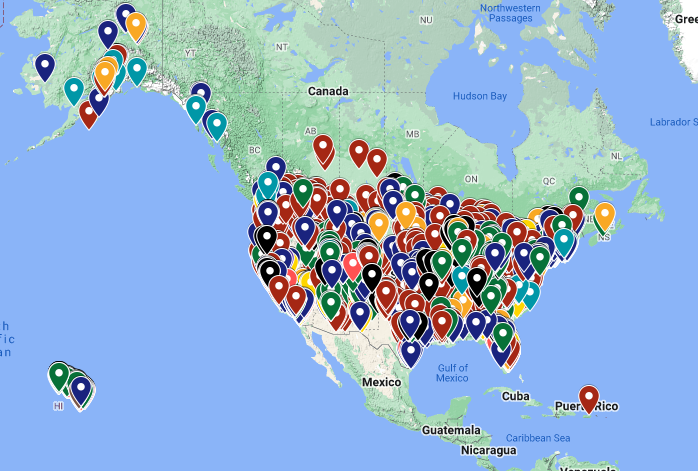Stop pesticide producers from gaining liability immunity.
Subscribe to My Health Forward
Published July 30, 2025.
A new federal bill will block the EPA from taking action against pesticide producers. Agrochemical companies like Bayer-Monsanto, ChemChina, BASF, and Corteva currently submit their own safety data and labels to the EPA which the EPA does not put to the test. The safety data and labels from pesticide has consistently been found to downplay risks and conflict with independent peer reviewed research. Section 453 of the Federal House Interior Appropriations bill blocks the EPA from approving a new pesticide label or updating an old label if the label changes conflict with a previous health test or carcinogenicity classification that the EPA previously approved. Since the pesticide labels that the EPA has previously approved were company submitted and don’t mention the cancer or chronic disease risks, the EPA can therefore never update or require new labels that highlight these risks. As a result, the EPA cannot update labels if new or existing research indicates that herbicides like glyphosate cause cancer, neonics cause birth defects, or paraquat causes Parkinsons.
The section also prevents the EPA from being able to litigate or take regulatory action against companies that commit fraud on their labels. The language in the clause would also give agrochemical companies liability immunity from lawsuits alleging that they didn’t warn people of the risk to health, property, and crops. The Federal House Interior Appropriations bill was introduced by Idaho congressman Mike Simpson who received $10,000 in lobbying from the pesticide producer BASF. The bill passed the subcommittee with a vote of 8-5 and then the House Appropriations Committee with a vote of 33-28. The bill will next be voted on by the House in August.
The proposed U.S. House Farm Bill will also give immunity to pesticide manufacturers from liability associated with adverse health effects or injuries from their chemicals. The bill will also remove local and state protections on pesticide application.
Congress has to vote on a new Farm Bill by Sept. 30, 2025, and there’s two sneaky provisions hidden inside the House’s proposed version to protect agrochemical companies. Section 10204 of the House Republican Farm Bill wants to give immunity to pesticide producers from liability lawsuits associated with any harm or adverse health effects caused by exposure to their chemicals. Section 10204 and 10205 would block state and local governments from passing laws about pesticides or requiring more disclosures. Over 40 states currently restrict pesticide use near schools because of the significant health risk posed by the close proximity to the pesticides. The EWG found that over 4,000 elementary schools are within 200 feet of a crop field where pesticides are sprayed. This number doesn’t include middle or high schools, private schools, parks, and playgrounds. The new farm bill would remove all active measures that protect the health and safety of schoolchildren and prevent new ones from being passed.
If you’re wondering why these provisions were included, all you need to do is follow the money. The House Agriculture Committee head Glenn Thompson received $25,000 in lobbying from three of the four largest agrochemical giants that have an oligopoly on pesticides and seeds. As of January 20th, Arkansas Senator John Boozman became the Senate Agriculture Chair. Boozman also received a staggering $47,250 from Syngenta, Bayer, and BASF. Since the heads of both the House and Senate Agriculture Committee are in support of chemical manufacturers, we can expect for the new farm bill to protect them and strip protections from farm workers and school children until at least 2029.
In response to the push to grant liability immunity to pesticide producers, Senator Cory Booker introduced Senate Bill 2324, A bill to amend the Federal Insecticide, Fungicide, and Rodenticide Act. The bill would create a federal right of action under the FIFRA to allow people to sue pesticide makers for causing chronic health conditions like cancer and Parkinson's disease. The bill has been endorsed by a number of health organizations.
It is extremely important that you contact your State and US Senators and Representatives. The goal of the call to action is removing Section 453 from the Interior-Environment Appropriations Bill and increasing support for Senate Bill 2324, A bill to amend the Federal Insecticide, Fungicide, and Rodenticide Act to establish a private right of action for injuries caused by pesticides, and for other purposes. Here are talking points for speaking with your representatives.
1). Pesticide producers have consistently misrepresented, downplayed, and withheld data on the carcinogenic and reproductive harms of their chemicals. The EPA should be able to update pesticide labels as new data suggests the damaging health, property, and crop risks of pesticides.
2. The EPA should be able to regulate and hold pesticide companies accountable. Stripping these rights endangers farm workers, gardeners, landscapers, school children, and all Americans.
3. Giving liability immunity to pesticide producers endangers Americans and takes away the only way we can take action against them. Americans should be able to take civil action against chemical companies for damages to their health, property, and crops.
Here is a full list of US House Representatives and their contact information. Here is a full list of US Senators and their contact information.
Subscribe to My Health Forward

Grow Your Own Organic Produce
I carry over 180 varieties of heirloom seed packets that are open-pollinated, non-gmo, pesticide-free, and breed true to type. Growing your own produce provides you with continual access to healthy and nutritious food.

Find Local Farms
Find farms near you using my map with over 6,500 local farms, ranches, markets, and stands across the country.
